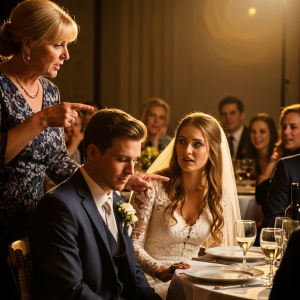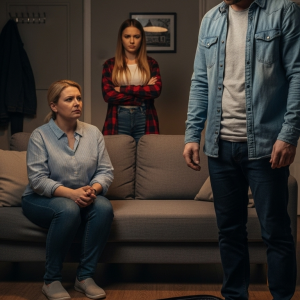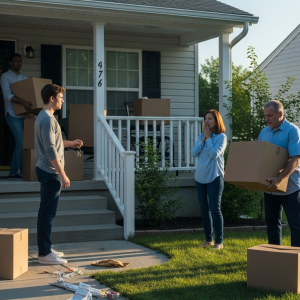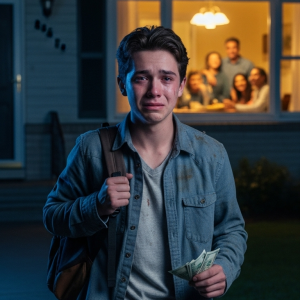When I was sixteen, my family took me camping and left me for dead in the woods. I remember the exact moment the world tilted. I was coming back to the campsite, my arms burning from a load of firewood, when I heard my father’s voice, low and final. “If he wants to survive, he’ll have to become a man to do it.” An hour later, I watched their car disappear down the dirt road, a plume of dust in its wake. They never once looked back.
For six years, that silence was all I had of them. Then, last month, my mother showed up at my work, sobbing.
It’s a long story. One that people in my real life either refuse to believe or get incredibly awkward about. Maybe internet strangers will understand.
My father, Clarence, has always worshipped at the altar of “toughness.” He saw softness in everything I did—a broken finger was no excuse to skip a football game, a moment of hesitation was a sign of weakness. My mother, Marion, was his silent echo, her compliance a form of agreement. And my little sister, Claire, then twelve, was a ghost in the machine, perpetually lost in the blue light of her phone.
The trip felt wrong from the start. Clarence’s comments were sharper, more pointed than usual. “Time to get out of your comfort zone, boy,” he’d said over breakfast, his eyes like steel bearings. My mother just kept meticulously packing trail mix, her silence a heavy blanket over the room.
The drive to the state forest was suffocating. Claire’s TikToks provided a tinny, annoying soundtrack to the tension. I tried to start a conversation, but Dad’s knuckles were white on the steering wheel, and Mom was fiercely focused on a Sudoku puzzle. We set up the tent at a desolate site—a fire ring, a splintered picnic table, and a foul-smelling outhouse. Clarence immediately started in on me, muttering about how I wasn’t pulling my weight, even as I hauled the heavy cooler.
That evening, a strange tableau formed around the campfire. Claire, scrolling. Mom, reading a paperback. And my father, just staring at me with an unnerving intensity, as if waiting for me to fail a test I didn’t know I was taking.
The next morning, he shook me awake before dawn. “We need real firewood,” he grunted, handing me a rusty hatchet. “Go past the trail. Find something that’ll burn.”
I was gone for nearly an hour, wandering deeper into the woods than I should have. There was no cell service. When I finally trudged back, I heard their voices and instinctively paused behind a thicket of birch trees.
“If he wants to survive, he’ll figure it out,” my father said.
My mother’s voice was a tremulous whisper. “Clarence, are you sure? This feels… cruel.”
“This is how my old man made me a man,” he snapped back. “He’ll thank us one day.”
I couldn’t hear Claire’s words, just the flat, bored tone of her voice. I felt the blood drain from my face. It had to be a joke. A twisted, horrible joke.
I stepped out from behind the trees. They froze, caught. Mom’s gaze darted to the ground. Dad just stared back, his expression unreadable. Claire wouldn’t even look at me. The firewood tumbled from my arms.
“What’s going on?” I asked, my voice barely a whisper.
Dad’s face was a mask of grim resolution. “You’ll be fine. You’re a man now. Figure it out.” He turned and began collapsing the tent.
Panic set in. I lunged for my backpack, but he shoved me back—not hard, but with an authority that was absolute. “Don’t make this harder than it has to be,” he warned.
Mom tried to protest, but a single sharp look from Clarence silenced her. She scurried to the car like a frightened mouse. I stood there, paralyzed, as they erased their presence from the campsite. Claire, walking past, threw my hoodie at me. It landed in the dirt. My mother tried to discreetly hand me a granola bar, but Dad’s voice boomed across the clearing: “Marion, get in the car. Now.” She dropped it and fled.
I picked up the granola bar as the trunk slammed shut.
“You can’t just leave me here,” I pleaded, the words tasting like ash.
“You’ll understand when you’re older,” he said, and then he was gone.
I watched the car drive away until it was just a memory. I stood there for what felt like hours, waiting for them to come back, for the punchline. But the only sound was the wind in the trees. My phone was nearly dead. No bars. My pockets held twelve dollars, a lighter, the hatchet, and the pathetic, crushed granola bar.
The next few days were a blur of hunger, fear, and a cold, simmering rage. The trail markers seemed to lead in circles. I drank from a stream, knowing it was a gamble. Every snapping twig at night sent a jolt of terror through me. More than fear, though, I felt a profound sense of betrayal. This wasn’t “tough love.” This was an exile.
Finally, after what felt like an eternity, a pair of hikers found me. They stared at my filthy clothes and wild eyes as if I were a creature from another world. When I croaked out that my family had left me, they exchanged a look of disbelief. They led me back to the trailhead and called the park rangers.
My Aunt Aurora picked me up. The drive was silent. At her house, she made me a sandwich and pointed to the couch. The next day, she explained that my parents were “taking some time” and that I should “think about what I did to push them that far.” That comment stung more than the hunger, more than the cold.
I stayed with her for a week, then stopped trying to call them. I was done. For six years, I heard nothing. I moved out at eighteen, built a life from scratch, and blocked them from every corner of my existence. Claire would occasionally send a meaningless meme on Instagram, a digital ghost I refused to acknowledge.
I thought I had buried them. I thought I had survived.
Then, last month, Marion walked into my workplace. Older, exhausted, her face a crumpled mess of tears. I didn’t even recognize her at first.
Six years of silence shattered in the middle of a Tuesday afternoon. I thought I was hallucinating. I had moved three towns over, changed my number, and built a fortress around my new life. Her finding me was no accident; it was a campaign.
She stood at the entrance to my shop, looking lost and frail. Before I could say a word, she collapsed into ugly, gasping sobs that shook her whole frame. She reached for my arm, and I recoiled on pure instinct. The few customers in the shop were staring.
“We need to go outside,” I said, my voice flat and cold.
Outside, she launched into a rambling, tear-soaked monologue. She was sorry, she missed me, she’d been looking for me. It was a performance, and I wasn’t buying a ticket.
“Get to the point, Marion,” I said, cutting through her tears. “I have to get back to work.”
She flinched, as if I’d slapped her. “It was never supposed to be like that,” she stammered. “Clarence… he just wanted to teach you a lesson. He thought you’d come back in a few hours, that you’d prove him wrong…”
“I’m not interested in his excuses,” I interrupted. “And I’m not interested in yours.”
She tried to grab my arm again, and this time I pushed her away. She stumbled, her eyes wide with shock. “I didn’t have a choice!” she cried. “He wouldn’t listen! I was scared of him!”
A hot, white anger burned through me. “Scared? You were always scared. You hid behind him your whole life. If you were so scared, why didn’t you call the cops? Why didn’t you call Aurora? Why didn’t you call anyone?”
She had no answer, just stared at the cracked pavement. Her silence was more damning than any lie.
“You let him leave me there,” I said, my voice dangerously low. “You never called. You never tried. You just dropped a granola bar and ran.”
The waterworks started again. She talked about how the family fell apart after I was gone. How Clarence grew meaner, how Claire started acting out, how they lost the house. She claimed she tried to reach me, but that Aurora wouldn’t give her my number—a lie I saw through instantly.
“What do you want from me?” I asked, point-blank.
“I just… I want to know you’re okay. I want to talk. Maybe get coffee.”
I laughed. A harsh, bitter sound. “You think you deserve that?”
The question hung in the air between us. She knew the answer. She knew she deserved nothing. A security guard from the mall ambled over, eyeing us warily. “Everything okay here?”
“Yeah,” I said, turning my back on her. “We’re done here.”
I walked back inside, my heart hammering against my ribs. She waited outside for an hour, sending a barrage of desperate, pleading texts. I blocked her number.
The next day, a DM from Claire: “Mom’s a mess. What did you say to her?” I ignored it. Then my phone started lighting up with calls and texts from old friends, cousins, even an ex-girlfriend. Marion had launched a full-scale emotional assault, contacting anyone who had ever known me, painting herself as a heartbroken mother desperate to reconnect. She even emailed my boss.
The rage was so intense I thought I might actually break something. I used a burner app to send her one final message: “Stop this now, or I will file a harassment complaint. This is your only warning.”
She replied almost instantly, begging, saying she had something important to tell me. I told her to leave me alone, or I would sever ties with every last person connected to our family, forever.
She finally agreed to stop. But as I read her last message, a cold resolve settled over me. She wanted to drag me back into their drama. She had no idea what she had just started. They thought I was still that scared kid in the woods. They were about to find out how well I had learned to survive.
I didn’t just want them to leave me alone anymore. That wasn’t enough. They had made me a ghost in their lives for six years; now, I was going to become a ghost in their machine. They wanted to be remembered? I would make sure they were remembered for exactly who they were.
I started digging. It’s amazing what you can find when you’re motivated by years of suppressed rage. I started with social media. Claire’s profile was a monument to teenage apathy. My father’s was more interesting. The posts had devolved from proud boasts about a new truck to angry, misspelled rants about “cancel culture” and “kids today.”
He had a small contracting business. I found its page, riddled with a few negative reviews and arguments in the comments section. People complaining he was unprofessional, condescending. It was the same Clarence I knew, just on a public stage.
I didn’t have to lie. I just had to amplify the truth.
I created a new profile and started messaging the people who had left negative reviews. I was polite, just a concerned potential customer. “I got a weird vibe from the owner,” I’d write. “Was your experience also negative?” One person told me Clarence had refused to honor a warranty. Another said he’d tried to aggressively upsell an elderly woman.
Then I started leaving my own reviews. Brief, honest, and cutting. “Unprofessional staff. Rude owner. Would not recommend.”
I moved to a local community Facebook group. I didn’t use my name. I just asked a simple question: “Has anyone else had a bad experience with Clarence’s Contracting?”
The dam broke. People started chiming in. And then, I dropped the bomb. I didn’t say it was me. I framed it as something I’d heard from a reliable source. “I heard a story once that the owner is the kind of man who would abandon his own son in the wilderness to ‘teach him a lesson.’ Can anyone confirm this?”
The comments section exploded. Some called me a liar, but the seed of doubt was planted. The best part was, Clarence couldn’t help himself. He waded into the comments, defensive and furious, yelling at people through his keyboard, proving my point with every keystroke. His business was already struggling; I was just giving it a firm, targeted push into the grave.
My mother, now living with Aurora, started sending frantic emails from new accounts. “Please stop, you’re destroying him! He’s losing everything! He’s blaming me!”
I didn’t answer.
I sent Clarence one piece of mail. A single, plain letter. In it, I detailed every moment of my ordeal in the woods. I described the hunger, the fear, the cold. I described how I built a life not just without him, but in spite of him. I ended it with a simple sentence: “I will never let you forget what you did. I will make sure no one else does either.”
A week later, I got a text from an unknown number. “You’re a liar and a coward. You’ll never be a real man.”
I blocked the number and smiled.
Family members started calling. An uncle screamed at me for “ruining the family name.” I hung up. Aurora tried to play mediator before admitting she couldn’t get involved because she needed Marion’s help with the rent. Their loyalty was as cheap as their character.
Even Claire texted. “Dad’s losing it. He keeps blaming everyone.”
I replied, “Maybe you should move out.” She left me on read.
Some might say I went too far. But they don’t know what it feels like to be deemed disposable by the people who were supposed to protect you. I wasn’t breaking laws. I was just holding up a mirror. And they were cracking under the reflection.
The end came faster than I expected. About two months after I started my campaign, the whispers became a roar. A former acquaintance DMed me: “Dude, did you hear? Clarence’s Contracting is shutting down.” The community Facebook group was filled with digital vultures picking over the carcass of his business. Some defended him, but most celebrated his downfall.
Then I got a call from a number I didn’t recognize. I let it go to voicemail. Curiosity got the better of me. I pressed play.
It was Clarence.
He was crying. Not just tearing up—he was broken. He tried to start strong, his voice thick with a false bravado, but then it shattered. “I’m sorry,” he choked out, the words mangled by sobs. “I know… I know I did wrong. I don’t know how to fix it. I’ve lost everything.” A long, shuddering breath. “I just wanted you to be strong… I didn’t want you to end up like me. I’m so sorry. Please… please call me back.”
Silence.
I played it again, the sound of my father’s complete and utter defeat washing over me. The man who preached toughness, who saw tears as the ultimate weakness, was weeping into my voicemail. For a moment, I considered calling back, to scream, to unleash six years of venom.
But I didn’t. There was nothing left to say. I deleted the message and blocked the number.
The family structure imploded. Aurora texted that Marion had finally left Clarence, taking Claire with her. He was sleeping on a friend’s couch. She told me Mom was a wreck, constantly asking about me. I told her I was done. “You’re being cruel,” she wrote. “You’re tearing this family apart.”
“The family was already broken,” I replied. “I just stopped pretending it wasn’t.”
Claire sent one last message: “You really ruined everything.”
I simply wrote back: “You were there. You watched him do it.” She never replied.
I still have the old hatchet from the woods. It sits in the back of my closet. Sometimes I look at it and think about the boy who was left to die. He’s not here anymore. I survived. I didn’t get an apology, not a real one. An apology born of desperation isn’t for the wronged; it’s for the wrongdoer. I don’t feel good, but I don’t feel bad. I feel… quiet.
I have no family left. But I am not alone. I built a new life, a new tribe. They can’t hurt me anymore. Revenge doesn’t heal the wound, but sometimes, it cauterizes it. It stops the bleeding. And now, finally, there is only silence.




